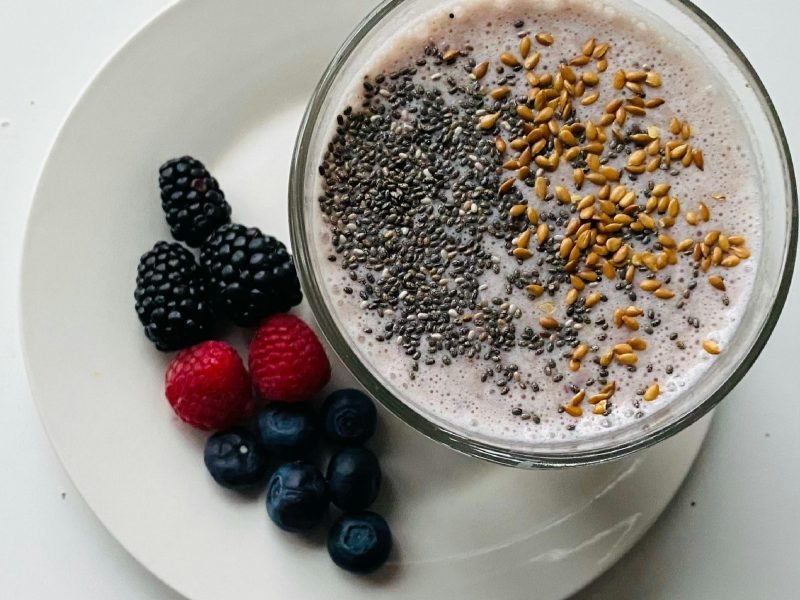Here is a fun fact, did you know that up to 85% of women experience menopausal symptoms? While we embrace the wisdom that comes with age, many of us are also looking for natural ways to ease menopause and manage the less-than-pleasant side effects of this natural transition.
In this article, we’ll explore incredible natural remedies that can help you achieve relief and sail through menopause with grace and comfort. Let’s dive in and discover how you can reclaim your vitality.
Understanding Menopause: What's Really Happening to Your Body?
Let’s talk about the dreaded “M” word – menopause. Trust me, I was just as clueless when it first hit me. I was totally unprepared, and perimenopause hit me like a ton of bricks! Those hot flashes and mood swings were horrible! So, what does it really mean?
Think of menopause as an uninvited guest that shows up and refuses to leave. Your body is telling you that your baby-making days are officially over! It comes in three stages: perimenopause (the preview), menopause (the main event), and post-menopause (the after-party).
Symptoms include hot flashes that make you feel like a human furnace, mood swings that could put any rollercoaster to shame, and let’s not forget the night sweats. I used to wake up completely soaked, like I’d gone for a midnight swim!
This is all thanks to our hormones going haywire. Estrogen and progesterone start playing hide-and-seek, and your body is like, “What the heck is going on?!” These hormonal fluctuations throw everything out of balance, leading to all sorts of chaos.
HRT, is it the Right Choice for You?
Now, some doctors may suggest hormone replacement therapy (HRT) as the ultimate solution, and for some women, it’s absolutely the right choice. I’m not saying HRT is wrong, but for others, it might not be an option due to family history or side effects that sound pretty scary. That’s where natural alternatives come in – they may feel safer and more appealing to many.
Remember, every woman’s journey is different. Don’t let anyone dictate how you should feel or what you should do. The choice is yours to make, and only you know what’s right for you.
Top 8 Natural Remedies for Menopause Symptoms
Menopause can be challenging, but natural remedies can offer real relief. The key is finding what works for you—every woman’s experience is unique, and a little trial and error can go a long way. By exploring these 8 natural remedies, you’re taking an empowering step toward managing menopause symptoms and feeling more like yourself again.

1. Black Cohosh: My Hot Flash Superhero
Black Cohosh has gained a reputation as one of the most popular herbal remedies for menopause, particularly for reducing hot flashes and night sweats. Research suggests that black cohosh interacts with your body’s opioid receptors, providing a natural pain-relieving effect. According to experts at Cleveland Clinic, Black Cohosh is often explored for its potential benefits in easing menopausal symptoms, but it’s important to consult your doctor before adding any new supplements, since Black Cohosh can interact with certain medications or conditions like liver issues
2. Evening Primrose Oil: Magic for Hormonal Balance
Evening Primrose Oil is a rich source of gamma-linolenic acid (GLA), which is thought to help regulate hormonal imbalances. Research, like that highlighted on WebMD, shows that GLA might also help reduce breast tenderness. As always, talk to your healthcare provider, as Evening Primrose Oil may not be suitable if you have certain conditions like epilepsy.
3. Flaxseed: Tiny Omega-3 Powerhouses
These tiny seeds pack a mighty punch! Flaxseeds are loaded with omega-3 fatty acids and lignans, which have estrogen-like effects and can help with vaginal dryness—a common menopause symptom. They’ve also been shown to promote mood stability, likely due to their anti-inflammatory properties. I personally sprinkle them on everything from yogurt to salads. Not only are they rich in fiber, but they also support digestion and heart health. Research also highlights the role of omega-3s, along with other vitamins, in combating vaginal dryness. Learn more about vitamins that can help with vaginal dryness here.
4. Red Clover: Nature’s Estrogen in a Flower
Red Clover is rich in isoflavones, plant-based compounds that mimic estrogen in the body, earning it the nickname “nature’s estrogen.” These isoflavones can help ease hot flashes, improve bone density, and even support heart health during menopause. Many women have reported significant improvements in their overall well-being. However, it’s important to use Red Clover in moderation, as excessive amounts can potentially interfere with hormone-sensitive conditions like breast cancer. Studies show that Red Clover can effectively reduce symptoms of menopause-related discomfort.
5. Ginseng: Natural Energy Boost Without the Jitters
Ginseng is a popular herb known for its adaptogenic properties, meaning it helps the body adapt to and manage stress. For menopausal women, it’s particularly valued for boosting energy levels and reducing fatigue. Unlike coffee, which can leave you jittery, ginseng provides a gentle energy lift and might even help improve mental clarity. Studies on WebMD show that ginseng can also improve mood, making it a versatile ally during menopause.
6. St. John's Wort: Lifting the Fog
If menopause has been ruining your mood, St. John’s Wort might be worth trying. Traditionally used to treat mild to moderate depression, it’s thought to help regulate mood by increasing serotonin levels in the brain. However, be cautious—St. John’s Wort can interact with several medications, including antidepressants and birth control, so make sure to consult with your doctor before taking it. Research confirms that St. John’s Wort is effective in treating mild to moderate depression, making it a potential mood booster during menopause.
7. Valerian Root: Sweet Dreams Await
When sleepless nights become a menopausal woman’s new normal, some have turned to Valerian Root, a natural sedative that has been used for centuries to combat insomnia. Doctors believe that it works by increasing levels of gamma-aminobutyric acid (GABA), a chemical that helps calm the brain and promote restful sleep. Mt. Sinai studies have shown that it helps reduce the time it takes to fall asleep and improves overall sleep satisfaction.
8. Sage: Not Just for Cooking!
Sage contains compounds like rosmarinic acid and flavonoids that are thought to have estrogenic effects, helping to ease menopausal symptoms Research demonstrates the efficacy in menopausal women with hot flushes
Research also shows that sage may even help improve memory and cognitive function, which can be a bonus during menopause.
Perhaps finding relief has become your life’s mission and trying everything at once may be tempting but trust me that is not a good idea. Everyone is different, so be patient and listen to your body. Give each remedy a few weeks before deciding if it works for you.
And remember, these work best when maintaining healthy lifestyle – making time for fitness, eating a balanced diet, and practicing stress management. I have found that Pilates session or a nice walk can do wonders for mood swings and hot flashes.
Menopause isn’t always a walk in the park, but with these remedies and a positive attitude, it doesn’t have to be a nightmare.
Lifestyle Changes to Complement Natural Remedies
Menopause is a wild ride, but a few tweaks to your daily routine can make a world of difference. Let me let you in on what’s worked for me and others:

Diet Makeover: Balance Your Hormones Naturally
Tweaking your diet during menopause can work wonders! Foods like soy, flaxseeds, and leafy greens are packed with phytoestrogens—nature’s hormone helpers. These plant compounds mimic estrogen, easing symptoms like hot flashes and mood swings. Just 2-3 servings a week could make a big difference!
Get Moving: Keep the Body and Mind Strong
Staying active is a must during menopause! Try 30 minutes of movement daily—like swimming, brisk walking, or cycling. Besides boosting your health, exercise releases endorphins, your natural mood boosters. Activities like strength training can be particularly beneficial, as they support bone health and muscle strength. Discover more about the Benefits of Strength Training for Women Over 50. Active women are healthier, stronger and often enjoy fewer mood swings and better sleep!
Zen It Out: Manage Stress for Better Mood and Hormonal Balance
Stress can make menopause symptoms worse by raising cortisol levels and messing with your hormones. Practices like meditation, yoga, or Pilates help reduce stress, boost mood, and improve sleep. Research shows mindfulness and deep-breathing exercises can even cut down on hot flashes by helping your body handle stress better.
Sleepy-Time Magic: Restorative Sleep is Crucial
Sleep can be tricky during menopause, but a relaxing bedtime routine can help. Keep your bedroom cool, wear comfy, breathable pajamas, and avoid screens an hour before bed to signal it’s time to unwind. Research shows that sticking to a consistent sleep schedule can make falling asleep easier. For a bonus, I recommend lavender pillow spray—its calming scent can promote relaxation and better sleep.
Drink Up : Hydration is Key
Staying hydrated is a game-changer during menopause! Water helps regulate body temperature, easing hot flashes, and supports digestion, reduces bloating, and fights headaches. It also helps prevent dryness—skin and vaginal. Aim for 8 glasses a day, and if plain water feels dull, add cucumber, lemon, or mint for a refreshing twist!
Foods That Ease Menopause Symptoms: The Power of Phytoestrogens
Ladies, let me introduce you to your other new best friend: phytoestrogens! These plant-based compounds are like nature’s hormone helpers. Here’s the scoop on how to incorporate them in your diet:

Soy to the Rescue: A Bite-Sized Boost of Estrogen
Tofu, tempeh, and edamame are soy-based powerhouses full of isoflavones, plant compounds that mimic estrogen. This can help during menopause when estrogen levels drop. Studies show that eating 2-3 servings of soy a week may reduce hot flashes and mood swings. Plus, soy’s a great source of plant-based protein, making it a double win for symptom relief and overall health.
Seed Sensation: Omega-3 Powerhouses
Flaxseeds and chia seeds are small but mighty, packed with omega-3 fatty acids and lignans to support hormonal balance. Omega-3s fight inflammation, helping with dry skin and vaginal dryness during menopause. Grinding 2 tablespoons of flaxseeds or adding 1 tablespoon of chia seeds to your oatmeal or smoothie can ease these symptoms and boost digestion and heart health. Plus, omega-3s may help stabilize your mood—perfect for those emotional rollercoasters!
Fruity and Veggie Goodness: Phytoestrogen Power
Berries, peaches, and cruciferous veggies like broccoli are packed with phytoestrogens—plant compounds that mimic estrogen. Eating 5-7 servings a day can help manage hot flashes and boost bone health. Cruciferous veggies, like broccoli, contain indole-3-carbinol, which helps balance estrogen metabolism during menopause. Plus, these foods are full of antioxidants that support skin health and combat aging-related oxidative stress.
Whole Grain Magic: Steady Energy, Balanced Hormones
Whole grains like barley, oats, and brown rice help balance hormones and keep your energy steady. Swapping refined carbs for whole grains prevents blood sugar spikes and crashes, reducing irritability and mood swings. Rich in vitamin B, these grains support energy metabolism and nerve function. Plus, their fiber aids digestion and may help lower cholesterol as we age.
Spice Up Your Life: Herbal Helpers
Fennel, sage, and red clover aren’t just kitchen staples—they’re herbal remedies with estrogen-like compounds. Sage tea is known to help with night sweats and hot flashes. Research shows fennel and red clover may ease symptoms like mood swings and vaginal dryness by boosting estrogen. One study even found red clover extract reduced hot flashes in postmenopausal women. So why not sip on some sage tea in the evening? It just might be your secret weapon against night sweats!
Mind-Body Techniques for Menopause Relief
Ladies, our minds are powerful tools in this menopause journey. Here’s how to harness that power:

Mindfulness Matters: A Mini-Vacation for Your Brain
Just 10 minutes of daily meditation can make a drastic difference! Mindfulness meditation helps you focus on the present, lowering stress and improving emotional balance. Research shows it also enhances sleep and reduces hot flashes. Simply put, calming the mind helps calm the body—exactly what you need during menopause.
Acupuncture Adventure: Needles That Work Wonders
Don’t be intimidated by tiny needles—acupuncture can be a game-changer for managing menopausal symptoms. Studies show that after 12 weekly sessions, women saw a 37% reduction in hot flashes. It works by balancing your energy and releasing endorphins to ease pain and stress. Plus, some women even notice a boost in libido with regular sessions. So, it’s not just about hot flashes—there’s an added bonus!
Scent-sational Relief: Let Aromatherapy Work Its Magic
Aromatherapy with oils like lavender and peppermint is a great way to support your well-being during menopause. Lavender is especially known for its calming effects, helping with sleep and anxiety. A few drops in a diffuser or a spritz of lavender pillow spray can create a relaxing bedtime atmosphere. Studies show essential oils can improve mood, promote relaxation, and even reduce hot flash frequency.
Breathe It Out: Paced Breathing for Hot Flash Relief
Paced breathing—taking about 6 breaths per minute for 15 minutes—can reduce hot flashes by up to 44%, according to studies. This technique activates your parasympathetic nervous system, helping your body cool down and relax. It’s not just for hot flashes—it also helps reduce stress and anxiety. I use it when I’m feeling overwhelmed, and within minutes, I’m calm and back in control
Remember, these techniques work best when practiced regularly. As your mind and body begin to improve, you will start to feel like your old self again – like the days before the whole menopause drama began!
When to Seek Professional Help for Menopause Relief
Sometimes, as much as we’d like, we cannot fix everything on our own and need to call in the professionals. Here are some tell-tale signs:

Natural Remedies Falling Short? Time to Call the Doctor
If natural remedies aren’t working for you and your symptoms are still disrupting your life, it might be time to seek professional help. For instance, if hot flashes are waking you up several times a week, or mood swings are affecting your relationships after three months of trying natural treatments, it’s a sign to consult your doctor. Persistent symptoms can lead to fatigue, anxiety, and even depression. Your healthcare provider can recommend treatments, including hormone therapy, to help improve your quality of life.
Annual Check-Ups: A Non-Negotiable Health Habit
Regular check-ups are essential, especially during menopause when your body is undergoing big changes. Keep track of changes in your menstrual cycle, breast health, and bone density. Menopause raises the risk of osteoporosis due to lower estrogen levels, so a bone density scan can help catch early signs of bone loss. Also, any changes in breast health, like lumps or pain, should be discussed with your doctor. Early detection is key to managing health issues, and your annual check-up is the perfect time to stay proactive.
Open Communication with Your Doctor: It’s a Partnership
Don’t hesitate to discuss all your symptoms, concerns, and preferences with your healthcare provider. They’re your partner in managing menopause, not just an authority figure. If you’re uncomfortable with hormone therapy, speak up! There are many options, from non-hormonal medications to alternative therapies. You should feel empowered to be involved in your treatment decisions, and open communication ensures that any prescribed therapies match your comfort level and lifestyle
Combining Treatments: It’s More Common Than You Think
Many doctors support combining natural remedies with conventional treatments, as long as it’s done safely. It’s important to tell your doctor about all the supplements and natural treatments you’re using. Some herbs and supplements can interact with medications, so your doctor needs the full picture to ensure your treatment is safe and effective. When done thoughtfully, combining approaches can help manage your symptoms more effectively.
Recognizing Red Flags: When Immediate Attention is Needed
Some menopausal symptoms require immediate medical attention. Sudden, heavy bleeding, severe chest pain, or extreme mood changes are red flags. If something feels off, trust your instincts and seek help right away. It’s always better to be safe and get a professional opinion if you’re experiencing concerning symptoms.
Final Thoughts
Managing menopause doesn’t mean you have to suffer through it! With these natural remedies and lifestyle changes, you’re now equipped with a powerful toolkit to face symptoms head-on. Remember, every woman’s journey is unique, so feel free to mix and match these solutions to find what works best for you.
That being said, there are times when natural remedies might not be enough. Some women, after trying various alternatives, have only found relief through hormone replacement therapy (HRT), and that’s okay! The goal is to find what works for you, whether it’s natural ways to ease menopause or conventional treatment.
Have you tried any of these remedies? Share your experiences—I’d love to hear them. After all, sharing is caring. Let’s support each other through this challenging phase of life and get through menopause without losing our sanity!




